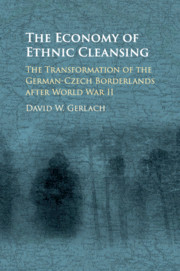Description
The Economy of Ethnic Cleansing
The Transformation of the German-Czech Borderlands after World War II
Author: Gerlach David Wester
Examines the economic motivations and complications that drove ethnic cleansing in the post-World War II Sudetenland.
Language: English
Subject for The Economy of Ethnic Cleansing:
Approximative price 34.17 €
In Print (Delivery period: 14 days).
Add to cart
The Economy of Ethnic Cleansing
Publication date: 03-2019
Support: Print on demand
Publication date: 03-2019
Support: Print on demand
Approximative price 109.06 €
In Print (Delivery period: 14 days).
Add to cart
The Economy of Ethnic Cleansing
Publication date: 11-2017
308 p. · 15.7x23.5 cm · Hardback
Publication date: 11-2017
308 p. · 15.7x23.5 cm · Hardback
Description
/li>Contents
/li>Biography
/li>
In the wake of World War II the Sudetenland became the scene of ethnic cleansing, witnessing not only the expulsion of nearly three million German speakers, but also the influx of nearly two million resettlers. Yet mob violence and nationalist hatred were not the driving forces of ethnic cleansing; instead, greed, the search for power and property, and the general dislocation of post-war Central and Eastern Europe facilitated these expulsions and the transformation of the German-Czech borderlands. These overlapping migrations produced conflict among Czechs, hardship for Germans, and facilitated the Communist Party's rise to power. Drawing on a wide range of materials from local and central archives, as well as expellee accounts, David Gerlach demonstrates how the lure of property and social mobility, as well as economic necessities, shaped the course and consequences of ethnic cleansing.
Introduction; 1. In the wake of war: expulsions, violence and borderland life; 2. National divisions: resettlement, local power and settler conflicts; 3. Persian rugs and well-appointed farms: the politics of expropriation; 4. German workers: Czech settlers and labor politics; 5. Consolidating borderland industries: from confiscation to nationalization; 6. borderlands transformed: diverse communities and the construction of socialism; Conclusion.
David Wester Gerlach is Associate Professor at Saint Peter's University, New Jersey. His current research explores restitution, reparation, and other compensation programs stemming from World War II, alongside the study of forced migration. He was awarded a Richard M. Hunt Fellowship for the Study of German Politics, Society, and Culture by the American Council on Germany in 2017, the R. John Rath Prize for Best Article in the 2007 Austrian History Yearbook, and the 2006–7 Best Dissertation by the Austrian Cultural Forum.
© 2024 LAVOISIER S.A.S.




